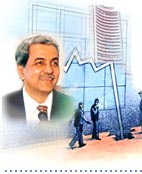Women
Partner Channels: Auctions | Auto | Bill Pay | Jobs | Lifestyle | TechJobs | Technology | Travel
March 13, 2001
|
|
|
|
|
|
||
|
Channels: Astrology | Broadband | Chat | Contests | E-cards | Money | Movies | Romance | Search | Weather | Wedding Women Partner Channels: Auctions | Auto | Bill Pay | Jobs | Lifestyle | TechJobs | Technology | Travel |
||
|
|
||
|
Home >
Money > Specials March 13, 2001 |
Feedback | |
|
 
NetScribes/Salil Panchal & Pallavi Rao
When the Securities and Exchange Board of India announced a probe into the bear hammering on the markets on March 1, it was a pointer to a new trend. It was the first time Sebi had announced a probe without any pressure from the media, thus indicating it was serious about booking those responsible. The Sensex reacted by sliding 176 points to close at 4095.
All the big names were seen to be involved. Calcutta-based Ajay Kayan (and his firm C Mackertich) and Bombay-based brokers R S Damani, Nirmal Bang, First Global and two of the biggest foreign institutional broking outfits Credit Suisse First Boston and JM Morgan Stanley. Reports that stockbroker Ketan Parekh was in trouble only made the markets more jittery. Parekh was said to have a large exposure in the infotech sector. The Global Trust Bank appeared to be heading for trouble as it reportedly had lent him considerable amounts of money for earlier transactions.
On March 3, the market witnessed consistent short-selling in frontline stocks, prompting Sebi to declare it would not spare those behind the bear hammering. In order to show it had collected enough margin money to ensure market safety, the exchanges said that margin in excess of Rs 70 billion had already been secured and the market was adequately prepared for a payment crisis. On February 28, the margin cover stood at Rs 65.4 billion.
Not satisfied with this, on March 5, Sebi took another step to curb further volatility in the markets. It banned naked short sales. While this will have a positive impact in the short term (brokers will take lower exposure and ensure delivery on sale positions), it would have the negative effect of reducing liquidity over the long term. Sebi also imposed a 10 per cent additional volatility margin on short sales.
These moves coincided with allegations of misuse of power by then Bombay Stock Exchange president Anand Rathi. Certain tapes available with Sebi suggested that Rathi had used information relating to specific brokers's positions and passed it on to other brokers. Following these allegations, Rathi offered to quit and asked Sebi to conduct an independent inquiry into the controversy.
The Sensex ended March 5 with a drop of 97 points at 3998.
After taking a day off for Bakri Id on March 6, the Sensex continued its nervous behaviour during intra-day trading on March 7, but closed a tad higher at 4046.89 points. Brokers's outstanding positions through the Automated Lending and Borrowing Mechanism touched an all-time high of 80 to 100 per cent, suggesting increased volatility and uncertainty in the markets.
Six days after the probe, Sebi showed no signs of relenting. At an internal meeting, Sebi's representative on the BSE board, L K Singhvi, suggested that necessary action would be taken. The bottomline: Rathi had to go. At a meeting that lasted over five hours, the BSE governing decided it had no option but to take steps towards improving its corporate image; it accepted Rathi's resignation.
Though that minimised the role of one alleged bear operator for the moment, the Calcutta Stock Exchange had gone into a bear phase by then. On March 8, the CSE was reportedly hit by a payment crisis with defaults of Rs 960 million, which later rose to Rs 1.2 billion. The Sensex closed just 10 points up at 4057.
By then, the Sebi probe was in full swing, with the authority acting on information provided by the BSE and the National Stock Exchange. It zeroed in on 11 major scrips (including some K-10 stocks). These were Wipro, Reliance Industries, Reliance Petroleum, Global Tele-Systems, MTNL, Hindustan Lever, Satyam, Zee Telefilms, Himachal Futuristic, Infosys and State Bank of India.
Meanwhile, the K-10 stocks continued their slide with even institutional investors like Morgan Stanley and others suggesting that there would be no upswing for them. These scrips had crashed 40 to 70 per cent in a week. On March 9, the Sensex closed 175 points down at 3881.
Sebi stepped in again. On March 11, it hiked additional margins on net outstandings from 10 per cent to 25 per cent with a view to curb greater volatility. To ensure safety at the other exchanges (considering that margin collections could not be ascertained immediately), Sebi also imposed that brokers's end-of-the-day outstandings would be limited to Rs 500 million at the regional bourses.
Even that failed to stop the markets from being jittery this week. On Monday, March 12, the Sensex closed 113.11 points down at 3767.89 in the absence of fresh buying from domestic mutual funds and foreign institutional investors. Domestic financial institutions did buy into select stocks, but that has obviously not helped turn the tide. By the end of the session, the markets were hit by rumours that Rathi would be interrogated for divulging market-sensitive information.
Late on Monday night, in an unprecedented move, Sebi suspended all seven broker members of the BSE governing board. Sebi insiders said the move was required to impose better governance of the BSE and transparency in transactions.
The brokers-directors suspended are BSE president Deena Mehta, Motilal Oswal, Himanshu
Kaji, Jayesh Sheth, Niranjan Nanavati, Kirit B Shah and Rathi who
stepped down as BSE president on Thursday following allegations that he
had misused his office to access information.
Significantly, Sebi said Rathi and 'his concerns...are directed not to undertake any
fresh business as a broker till further orders.'
But this may not clear the overall sentiment on the BSE which is one of confusion. The retail investor is not out of the market; he is shell-shocked and waits along the sides, seeking the right opportunity to return to the markets. To sum up the journey of the Sensex from March 1 till March 12 -- 503.11 points lost in seven trading days.
Design: Lynette Menezes
|
||||